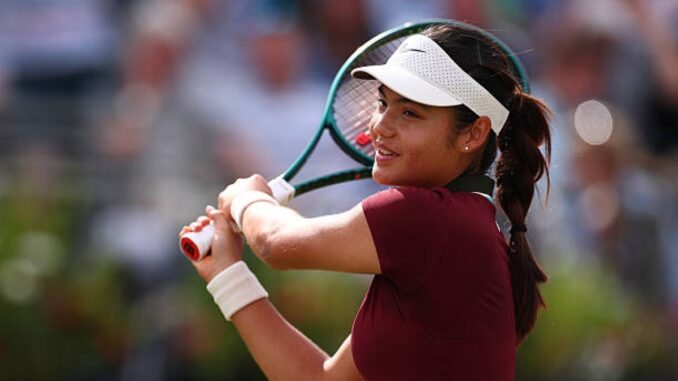
Emma Raducanu, the 2021 US Open champion, has ignited a firestorm of discussion in the tennis world with her recent comments on the persistent prize money disparity between men’s and women’s tournaments. At 22, the British tennis star, fresh off a quarterfinal run at the historic Queen’s Club Championships, found herself at the center of controversy after addressing the pay gap during a press conference. Her remarks, which emphasized a personal detachment from the financial aspects of the sport, have drawn both admiration and criticism, highlighting the complex dynamics of gender equality in professional tennis.
The Queen’s Club, a prestigious venue long associated with men’s tennis, welcomed a WTA 500 event for women in 2025, marking the first women’s tournament there since 1973. The event featured a stellar lineup, including 2025 Australian Open champion Madison Keys, former Wimbledon winners Barbora Krejcikova and Elena Rybakina, and British No. 1 Katie Boulter. However, the prize money for the women’s tournament—$1.415 million—paled in comparison to the men’s ATP 500 event, which boasted a prize pool exceeding $2.89 million. The women’s champion, Tatjana Maria, earned €141,000, while the men’s winner was set to take home €471,755, a stark reminder of the financial inequities that persist outside of Grand Slams, where prize money is equal.
When asked about this disparity, Raducanu’s response was candid but polarizing. “There is obviously a big difference [in prize money], and I’m sure a lot of players will kind of say their piece on it, but I just prefer not to get involved and just whatever the situation is I’ll kind of roll with it, but I’m never really going to take a stand either way,” she told reporters. She added, “I don’t really get involved or kind of stay in the loop with all the boards and all the decisions and stuff. I kind of just get on with it and I don’t feel like I really am playing for money. Of course I need to sustain my team, which is extremely expensive, and you know… with my kind of profile, coaches and team members kind of see that. So it is a very expensive sport, but it’s not my main motivator of why I play.”
Raducanu’s comments come against the backdrop of her financial success, both on and off the court. With career prize money totaling approximately $5.2 million, largely from her 2021 US Open victory, and an estimated $20 million from sponsorships with brands like Dior, Porsche, and HSBC, she occupies a privileged position in the sport. Her stance has drawn sharp criticism from some fans and players who argue that her reluctance to advocate for equal pay undermines the efforts of those who rely on prize money to sustain their careers. “We need to make tennis available for poor people because these girls all come from rich families and don’t care enough to fight for the money women deserve,” one fan remarked on social media, echoing a sentiment that Raducanu’s wealth allows her to sidestep an issue that affects many of her peers.
Interestingly, Raducanu’s current position contrasts with her earlier remarks in 2024, when she criticized the prize money gap at the Italian Open, stating, “A lot of women’s players are technically better. They rely on speed, agility, and brain rather than brute strength. The prize money gap is huge on the ATP tour, which I don’t necessarily think is fair.” This apparent shift in perspective has fueled debate, with some suggesting that her latest comments reflect a lack of maturity or preparation for such questions, while others defend her right to focus on her game rather than advocacy.
The Lawn Tennis Association (LTA), which organizes the Queen’s event, has pledged to achieve prize money parity by 2029. CEO Scott Lloyd emphasized this commitment, stating, “We are making significant increases this year to the women’s prize money at Queen’s and Eastbourne and want to achieve equal prize money as soon as possible. The LTA is committed to growing women’s tennis, both at professional and grass-roots level, and this move is an important part of that commitment.” Despite these efforts, the financial realities of the sport remain challenging, with the LTA reporting a £4 million loss across its grass-court events last year, underscoring the complexities of balancing profitability with equity.
Raducanu’s journey in 2025 has been one of resilience, as she navigates an ongoing back injury and fluctuating form. Her quarterfinal appearance at Queen’s earned her $38,142 and 108 ranking points, propelling her to world No. 36 and reclaiming her status as British No. 1. As she prepares for Wimbledon, where she hopes to leverage her aggressive baseline game and powerful backhand, the debate over her comments continues to ripple through the tennis community. While Raducanu insists that money is not her motivation, her words have reignited a broader conversation about the responsibility of high-profile athletes to advocate for change in a sport where financial disparities remain a persistent challenge.
Leave a Reply